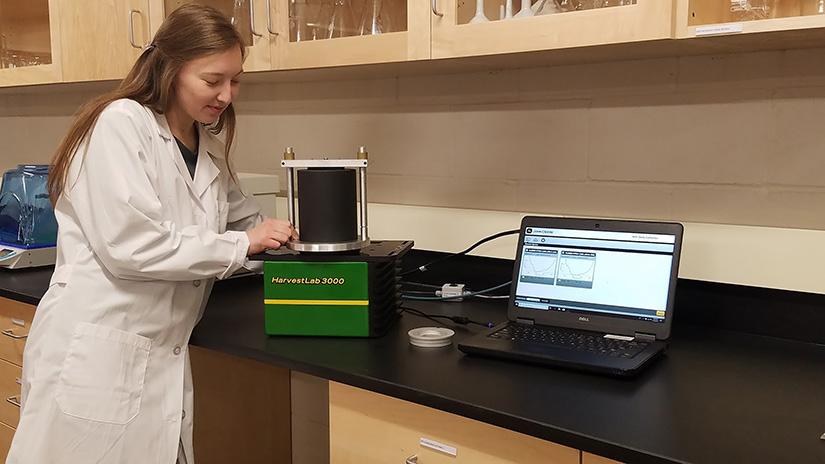UNIVERSITY OF WISCONSIN River Falls
Newsroom
UW-River Falls undergraduate research assistant Allyssa Frahm calibrates a near-infrared reflectance spectrometer, the underlying technology of the Deere & Company HarvestLab™ 3000 manure sensing system.
Students have role in precision agriculture innovation
June 28, 2019 - Another advance in precision agriculture was made by John Deere and students at the University of Wisconsin-River Falls played a role. Earlier this month John Deere announced the release of the HarvestLab™ 3000 with Manure Constituent Sensing. UW-River Falls faculty and students in agricultural engineering helped to ensure the technology would provide producers with accurate information on important nutrient constituents in the manure.
Manure is a useful by-product of livestock industries, containing nutrients that can be valuable to crop production and reducing the reliance on synthetic fertilizers. But manure composition is highly variable and dependent on many factors including animal species, age and diet, bedding, climate and manure handling practices. The Manure Constituent Sensing technology from John Deere uses near-infrared sensors to provide real-time measurement of total nitrogen, ammonium-nitrogen, potassium, phosphorus and dry matter content of the manure as it being applied in the field. Producers can adjust the volume being applied to meet the specific nutrient requirements for their fields.
John Deere first approached Matthew Digman, assistant professor of agricultural engineering, for assistance collecting and analyzing dairy manure samples from Wisconsin. Although John Deere was already using the Manure Constituent Sensing technology in the European Union, livestock manure in the U.S. is compositionally different. So manure from U.S. farms needed to be sampled, analyzed and compared to the predicted composition from the Manure Constituent Sensor system.
Beginning in fall 2017, Digman and his students reached out to producers who might be willing to participate and then set out across the state collecting manure samples. Back on campus, they processed the samples through the John Deere Manure Constituent Sensing test stand and sent sub-samples to the University of Wisconsin Soil and Forage Lab in Marshfield for wet chemical analysis. The students handled the data collection and organization, maintained the database of metadata collected along with each sample, and participated in meetings with the John Deere staff overseeing the project.
Eventually John Deere expanded this effort, with UW-River Falls as the sole North American collaborator on this project to sample and test dairy and swine manure from across the U.S. and Canada. This necessitated a change in the collection process and one of the students developed the “manure by mail” program with easy to follow instructions for the producers and all the supplies necessary, including instant ice packs to keep the sample chilled while in route.
Over the nearly two years this project has been in existence, seven UWRF undergraduates were engaged in the effort. They are: Julia Rogers of St. Paul, Allyssa Frahm of Schofield, Miriam Zarling of Mount Pleasant, Aaron Timm of Plainview, Minn., Madison Schochenmaier of Waconia, Minn., Jacob Burg of LaCrescent, Minn., and Samantha Payne of Murdock, Minn.
“It was a really great learning experience to be able to work directly with the engineers and John Deere to solve problems and meet their goals,” said Rogers, who was involved with this project from the beginning. “It was fun to apply information I learned in classes to the project and things I learned on the project to my classes. And now it’s really exciting to see something I’ve worked on go to market!”
It was Schochenmaier who used her organizational and planning skills to create the manure by mail protocol.
“Now that the technology is released, I am super excited to finally be able to say I was part of the development,” Schochenmaier said. “Though we may have been doing what some consider the ‘grunt work,’ I feel we learned a lot about how much effort it takes to launch a new product.”
The completion of this phase of the work was well-timed for Digman as he accepted a position at UW-Madison beginning fall 2019.
“We already get along very well with our sister department at UW-Madison,” Joe Shakal, professor of agricultural engineering and chair of the department said. “Matt’s transition will strengthen the ties between our two departments and better enable us to work together to provide research and development solutions to our corporate stakeholders, while giving students meaningful hands-on laboratory experiences.”
John Deere and HarvestLab™ 3000 are trademarks of Deere & Company.











